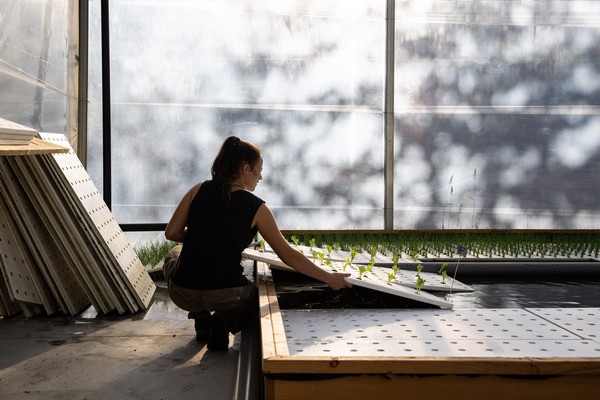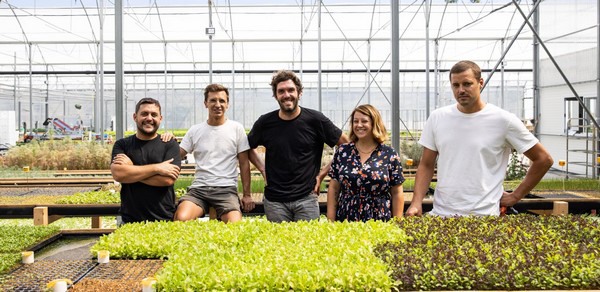Les Nouvelles Fermes, a French startup, has just 'cracked a model' by developing an urban aquaponics farm halfway between low and high tech. It introduces an original model for farms in metropolitan areas. After launching a first experimental farm in Lormont (33) in 2019, the societal impact company raised €2 million in 2021 to build one of the largest aquaponics farms in Europe. Every day, vegetables, herbs, and fish are produced using aquaponics, a closed-loop cultivation method that does not use synthetic chemical fertilizers or antibiotics. On a 5,000m² (eq. 53000 sqft) site in Mérignac, 60 tons of fresh produce and 12 tons of rainbow trout will be produced annually. Faced with the urgency to act for sustainability and French agriculture, Les Nouvelles Fermes offers an alternative that combines productivity and environmental respect. Their goal: to deploy this future model in the largest metropolises of France within the next five years and achieve €30 million in revenue.
France has historically been a major agricultural country. In 2021, it exported nearly 70 billion euros in agricultural and agri-food products and remained the leading producer in Europe ahead of Germany and Italy. However, this industry has been declining in recent years. These figures hide the increase in imported products in many sectors, with 48% of consumed fruits and vegetables coming from abroad. It is also the second most polluting sector in France, responsible for 21% of greenhouse gas emissions due to the use of intensive production techniques. To address these issues, the five co-founders, Laura Gaury, Thomas Boisserie, Clément Follin Arbelet, Paul Morel, and Edouard Wautier, decided to venture into aquaponic farming, a serious alternative for agriculture in the future. Their goals are to reduce the environmental impact of agriculture and offer a more sustainable production alternative with environmentally friendly farming techniques.

In 2019, they launched Les Nouvelles Fermes, a French startup at the intersection of market gardening, agro-industry, and startups. The company locally produces herbs, vegetables, and fish (rainbow trout) by leveraging aquaponics: a closed-loop cultivation system that combines fish farming in symbiosis with plant cultivation. This ancient and sustainable cultivation method requires low water and energy consumption and prohibits the use of synthetic chemical fertilizers and antibiotics.
A first experimental farm of 1000m² was launched in Lormont, producing 10 tons of fresh produce and 2 tons of rainbow trout per year. Distributed through short supply chains to restaurants, retailers, hypermarkets, and supermarkets, Les Nouvelles Fermes strives to offer ultra-fresh products cut on the day within a 20 km radius of the production site, recreating proximity between urban dwellers and farmers.
Water saving, carbon footprint reduction, and improved yields.
Guided by the ambition to replicate their farm model in major urban centers in France and Europe, the five founders launched a second operation in Mérignac in 2021. The farm, covering an area of 5000 m², already achieves significant production: 60 tons of ultra-fresh vegetables (lettuce, herbs, young shoots in cut and live plant forms…) and 12 tons of rainbow trout will be cultivated in a year. In addition to being efficient, the operation brings significant environmental benefits: it requires 4 times less energy and 10 times less water than an equivalent traditional farm. Lastly, the synergistic aquaponics system generates products that can achieve 10 times higher yields (such as chard, which can exceed 24kg/m2/year compared to 2-3kg/m2/year in open field cultivation) while maintaining a high nutrient content. For example, Les Nouvelles Fermes' lettuce retains 95% of its vitamin C, compared to 33% for lettuce harvested 48 hours before being displayed.
By placing innovation, a low-tech spirit, and sustainability at the heart of agriculture, Les Nouvelles Fermes offers a proven concept of aquaponic farming. This approach revitalizes the agricultural sector on French soil and reduces its carbon footprint by maximizing production in a sustainable and efficient manner.

Goals for 2028: Deploy a network of productive farms in major French metropolitan areas.
"Aquaponic farming provides a concrete and proven solution for the necessary revision and evolution of our agricultural practices. Resolutely optimistic, this intensive agriculture without synthetic chemicals offers proven profitability in addition to strong energy savings: 90 to 95% water saved, 4 to 5 times less energy used, up to 10 times higher yields, no antibiotic treatments used… In the first 6 months of operation of the Mérignac farm, the equivalent of 0.3% of the population of Bordeaux Métropole consumed our products. By 2023, our production will be able to meet 4% of this metropolis' trout needs and 1% of its lettuce and other leafy greens. That's why we aim to open several farms in France by 2028 before exploring international opportunities. This growth would allow us to supply 1% of the French trout production while saving the equivalent of 300 Olympic-sized swimming pools of water each year and reducing CO2 emissions by 450 tonnes," explains Thomas Boisserie, co-founder of Les Nouvelles Fermes.
Within the next 5 years, Les Nouvelles Fermes aims to produce 1,800 tons of fresh produce and 360 tons of trout annually. To support this growth in the French territory, Les Nouvelles Fermes will be seeking profiles for positions such as farm manager, versatile urban farmer, support functions, and more.
For more information:
Les Nouvelles Fermes
lesnouvellesfermes.com
